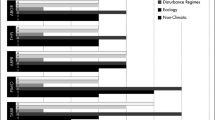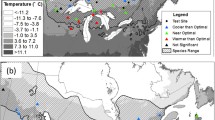Abstract
Approximately 185,000 forest inventory and ecological plots from both USA and Canada were used to predict the contemporary distribution of western larch (Larix occidentalis Nutt.) from climate variables. The random forests algorithm, using an 8-variable model, produced an overall error rate of about 2.9 %, nearly all of which consisted of predicting presence at locations where the species was absent. Genetic variation among 143 populations within western larch’s natural distribution was predicted from multiple regression models using variables describing the climate of the seed source as predictors and response data from two separate genetic tests: 1) 15-year height at a field site in British Columbia, Canada, and, 2) two principal components of 8 variables describing growth, disease tolerance, and phenology of 6-year-old trees in a test in Idaho, USA. Presence and absence of the species and genetic variation within the species were projected into future climates provided by three General Circulation Models and two scenarios. Although the projections described pronounced impacts on the species and its populations, concurrence among the six projections pinpointed areas where the probability would be high that the future climate would be suitable for western larch. Concurrence among projections also was used to locate those sources of seed that should be best attuned genetically to future climates. The procedures outline a logical approach for developing management strategies for accommodating climate-change while taking into account the variability imposed by the differences among climatic estimates.










Similar content being viewed by others
References
Ackerly DD (2003) Community assembly, niche conservatism, and adaptive evolution in changing environments. Int J Plant Sci 164(Supplement):S165–S184
Aitken SN, Yeamean S, Holliday JA, Wang T, Curtis-McLane S (2008) Adaptation, migration or extirpation: climate change outcomes for tree populations. Evol Appl 1:95–111
Alerich CA, Klevgard L, Liff C., Miles PD (2004) The forest inventory and analysis database: database description and users guide, version 1.7. http//www.ncrs2.fs.fed.us/4800/fiadb_documentation/FIADB_v17_122104.pdf
Bechtold WA, Patterson PL (2005) The enhanced forest inventory and analysis program—national sampling design and estimation procedures. U. S. Department of Agriculture, Forest Service, Southern Research Station General Technical Report SRS-80, Ashville, North Carolina
Breiman L (2001) Random forests. Mach Learn 45:5–32
British Columbia Ministry of Forests and Range (2009) BEC Master ecosystem plot. Database [MSAccess 2003 format]. Research Branch, Victoria, B.C
Brown DE, Reichenbacher F, Franson SE (1998) A classification of North American biotic communities. University of Utah Press, Salt Lake City
Cooper, SV, Neiman KE, Roberts DW (1991) Forest habitat types of northern Idaho: second approximation. General Technical Report INT-236. U.S. Department of Agriculture, Forest Service, Intermountain Forest and Range Experiment Station, Ogden, Utah
Davis MB, Shaw RG (2001) Range shifts and adaptive responses to Quaternary climate change. Science 292:673–676
Davis MB, Shaw RG, Etterson JR (2005) Evolutionary responses to changing climate. Ecology 86:1704–1714
Fins L, Seeb L (1986) Genetic variation in allozymes of western larch. Can J For Res 16:1013–1018
GLOBE (1999) The Global Land One-kilometer Base Elevation (GLOBE) Digital Elevation Model, Version 1.0. http://www.ngdc.noaa.gov/seg/topo/globe.shtml
Gómez-Mendoza L, Arriaga L (2007) Modeling the effect of climate change on the distribution of oak and pine species of Mexico. Conserv Biol 21:1545–1555
Hutchinson GC (1958) Concluding remarks. Cold Spring Harbor Symposium on Quantitative Biology 22:415–427
Hutchinson MF (1991) Continent wide data assimilation using thin plate smoothing splines. In: Jasper JD (ed) Data assimilation Systems. Bureau of Meteorology, Research Report 27, Bureau of Meteorology, Melbourne. pp104–113
Hutchinson MF (2000) ANUSPLIN Version 4.1 User’s Guide. Australian National University, Centre for Resource and Environmental Studies, Canberra
Iverson LR, Prasad AM (1998) Predicting abundance of 80 tree species following climate change in the eastern United States. Ecol Monogr 68:465–485
Iverson LR, Prasad AM, Matthews S (2008) Modeling potential climate change impacts on the trees of the northeastern United States. Mitig Adapt Strat Glob Change 13:487–516
Jaquish BC, Howe G, Fins L, Rust M (1995) Western larch tree improvement programs in the Inland Empire and British Columbia. In: Schmidt WC, McDonald KC (eds) Ecology and management of Larix forests: a look ahead. October 1992, Whitefish, Montana. Gen Tech Trp. INT-GTR-319. USDA Forest Service, Intermountain Research Station, Ogden, Utah pp, pp 452–460
Jaquish BC, El-Kassaby Y (1998) Genetic variation of western larch in British Columbia and its conservation. J Hered 89(3):248–253
Joyce DG (1985) Juvenile shoot growth and yield potential in western larch. University of Idaho, Moscow. Ph.D. Dissertation
Jump AS, Mátyás C, Peñuelas J (2009) The altitude-for-latitude disparity in the range retractions of woody species. Trends Ecol Evol 1147:694–701
Khasa DP, Jaramillo-Correa JP, Jaquish B, Bousquet J (2006) Contrasting microsatellite variation between subalpine and western larch, two closely related species with different distribution patterns. Mol Ecol 15:3907–3918
Liaw A, Wiener M (2002) Classification and regression by Random Forests. R News 2:18–22
Ledig FT, Rehfeldt GE, Sáenz-Romero C, Flores-López C (2010) Projections of suitable habitat for rare species under global warming scenarios, and recommendations for conservation of the Mexican spruces. American Journal of Botany (In Press)
Little EL Jr (1971) Atlas of United States trees, volume 1, conifers and important hardwoods. U.S. Department of Agriculture, Miscellaneous Publication 1146. Washington, DC
McKenney DW, Pedlar JH, Lawrence K, Campbell K, Hutchinson MF (2007) Potential impacts of climate change on the distribution of North American trees. Bioscience 57(11):939–948
Monserud RA, Tchebakova NM, Leemans R (1993) Global vegetation change predicted by the modified Budyko model. Clim change 45:59–83
Morgenstern EK (1996) Geographic variation in forest trees. UBC Press, Vancouver, BC
Nitschke CR, Innis JL (2008) A tree and climate assessment tool for modeling ecosystem response to climate change. Ecol Model 210:263–277
Parmesan C (2006) Ecological and evolutionary responses to recent climate change. Annu Rev Ecol Evol Syst 37:637–69
Pojar J, Klima K, Meidinger D (1987) Biogeoclimatic ecosystem classification in British Columbia. For Ecol Manag 22:119–154
Prentice IC, Cramer W, Harrison SP, Leemans R, Monserud RA, Solomon AM (1992) A global biome model based on plant physiology and dominance, soil properties and climate. J Biogeogr 19:117–134
R Development Core Team (2004) R: A language and environment for statistical computing. R Foundation for Statistical Computing, Vienna
Rehfeldt GE (1982) Differentiation of Larix occidentalis populations from the Northern Rocky Mountains. Silvae Genet 31:13–19
Rehfeldt GE (1992) Breeding strategies for Larix occidentalis: adaptations to the biotic and abiotic environment in relation to improving growth. Can J For Res 22:5–13
Rehfeldt GE (1995) Genetic variation, climate models and the ecological genetics of Larix occidentalis. For Ecol Manag 78:21–37
Rehfeldt GE (2004) Interspecific and intraspecific variation in Picea engelmannii and its congeneric cohorts: biosystematics, genecology, and climate-change. General Technical Report RMRS-134, U.S. Department of Agriculture, Forest Service, Rocky Mountain Research Station, Fort Collins, CO
Rehfeldt GE (2006) A spline climate model for western United States. General Technical Report 165. U.S. Department of Agriculture, Forest Service, Rocky Mountain Research Station, Fort Collins, CO
Rehfeldt GE, Crookston NL, Warwell MV, Evans JS (2006) Empirical analyses of plant-climate relationships for the western United States. Int J Plant Sci 167:1123–1150
Rehfeldt GE, Ferguson DE, Crookston NL (2008) Quantifying the abundance of co-occurring conifers along Inland Northwest (USA) climate gradients. Ecology 89:2127–2139
Rehfeldt GE, Ferguson DE, Crookston NL (2009) Aspen, climate, and sudden decline in western USA. For Ecol Manag 258:2353–2364
Rehfeldt GE, Tchebakova NM, Parfenova E (2004) Genetic responses to climate and climate change in conifers of the temperate and boreal forests. Recent Research & Developments in Genetics & Breeding 1:113–130
Rehfeldt GE, Tchebakova NM, Parfenova YI, Wykoff RA, Kuzmina NA, Milyutin LI (2002) Intraspecific responses to climate in Pinus sylvestris. Glob Chang Biol 8:912–929
Rehfeldt GE, Wykoff RA, Ying CC (2001) Physiologic plasticity, evolution, and impacts of a changing climate in Piuns contorta. Clim change 50:355–376
Rehfeldt GE, Ying CC, Spittlehouse DL, Hamilton DA Jr (1999) Genetic responses to climate in Pinus contorta: niche breadth, climate change, and reforestation. Ecol Monogr 69:375–407
Saenz-Romero C, Rehfeldt GE, Crookston NL et al (2010) Contemporary and projected spline climate surfaces for Mexico and their use in understanding climate-plant relationships. Clim change. doi:10.1007/s10584-009-9753-5
Savolainen O, Pyhajarvi T, Knurr T (2007) Gene flow and local adaptation in trees. Annual Review of Ecology, Evolution, and Systematics 38:595–619
St Clair JB, Howe GT (2007) Genetic maladaptation of coastal Douglas-fir seedlings to future climates. Glob Chang Biol 13:1441–1454
Tchebakova NM, Rehfeldt GE, Parfenova EI (2005) Impacts of climate change on the distribution of Larix spp. and Pinus sylvestris and their climatypes in Siberia. Mitig Adapt Strat Glob Change 11:861–882
Tchebakova NM, Rehfeldt GE, Parfenova EI ( 2010) From vegetation zones to climatypes: effects of climate warming on Siberian ecosystems In: A. Osawa, et al. (ed) Permafrost Ecosystems: Siberian Larch Forests, Ecological Studies 209. Springer. doi:10.1007/978-1-4020-9693-8_22
Thuiller W, Albert CH, Araújo MB et al (2008) Predicting global change impacts on plant species distributions: future challenges. Perspect Plant Ecol Evol Syst 9:137–152
Turesson G (1925) The plant species in relation to habitat and climate. Hereditas 6:147–236
USGS (2005) Digital representations of tree species range maps, From: Little, EL Jr (1971). Atlas of United States trees, volume 1, conifers and important hardwoods. U.S. Department of Agriculture, Miscellaneous Publication 1146. Washington, DC. http://climchange.cr.usgs.gov/data/atlas/little
Wang T, Hamann A, Yanchuk A, O’Neill GA, Aitken SN (2006) Use of response functions in selecting lodgepole pine populations for future climates. Glob Chang Biol 12:2404–2416
White TW, Adams WT, Neale DB (2007) Forest genetics. CAB International
Woodward FI (1987) Climate and plant distribution. Cambridge University Press, London
Zhang JW, Fins L (1993) Variation in shoot growth components among western larch families. Can J For Res 23(8):1520–1527
Zhang JW, Marshall JD (1994) Population differences in water-use efficiency of well-watered and water-stressed western larch seedlings. Can J For Res 24:92–99
Zhang JW, Fins L, Marshall JD (1994) Stable carbon isotope discrimination, photosynthetic gas exchange, and growth differences among western larch families. Tree Physiol 14:531–539
Acknowledgment
We appreciate the technical support of Nicholas Crookston, Rocky Mountain Research Station, Moscow, Idaho. Elizabeth Campbell, British Columbia Ministry of Forests and Range, provided access to B.C. ecological data.
Author information
Authors and Affiliations
Corresponding author
Rights and permissions
About this article
Cite this article
Rehfeldt, G.E., Jaquish, B.C. Ecological impacts and management strategies for western larch in the face of climate-change. Mitig Adapt Strateg Glob Change 15, 283–306 (2010). https://doi.org/10.1007/s11027-010-9217-2
Received:
Accepted:
Published:
Issue Date:
DOI: https://doi.org/10.1007/s11027-010-9217-2




